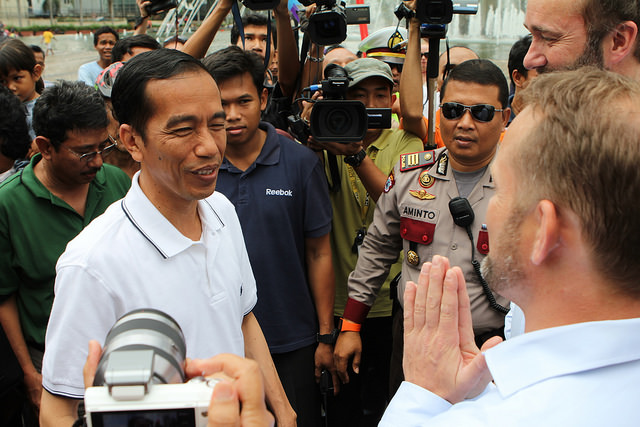 Tired of the humiliating dictates of Indonesian Democratic Party for Struggle (PDI-P) leader Megawati Sukarnoputri, Indonesia’s President Joko Widodo now has a new option—running for the former ruling Golkar Party in the 2019 elections.
Tired of the humiliating dictates of Indonesian Democratic Party for Struggle (PDI-P) leader Megawati Sukarnoputri, Indonesia’s President Joko Widodo now has a new option—running for the former ruling Golkar Party in the 2019 elections.
Describing the party switch as a ‘back-up’ plan, senior Golkar sources say the party intends to officially announce its willingness to endorse Widodo as a presidential candidate for 2019 following the end of the Ramadan in July.
Switching parties isn’t a decision Widodo would take lightly. But political coordinating minister Luhut Panjaitan’s success in engineering Setya Novanto’s elevation to the Golkar chairmanship last month gives the President a lot more leverage over PDI-P, where he’s never been treated with the deference one would expect the President to command.
While moving to Golkar would be game-changer—but not one he would decide on now—getting into bed with the late president Suharto’s political machine will be fraught with difficulties that will clearly be more political than personal, as they are now.
Widodo could have other options too. The Constitutional Court’s decision to hold the legislative and presidential elections on the same day, and not three months apart, removes the vote-getting criteria any party must meet to nominate a presidential palace candidate.
Novanto’s election to the Golkar post certainly underlines Panjaitan’s political muscle and the fact that since the beginning of the democratic era Golkar has always been under the control of what’s essentially a government proxy, as befits its history as a ruling party.
Panjaitan was former Golkar chairman Aburizal Bakrie’s presidential campaign manager before crossing over to the PDI-P to play a key role in Widodo’s victory over Great Indonesia Movement Party rival Prabowo Subianto in the July 2014 race.
While Panjaitan has refused a job in the Golkar party structure, Novanto’s election left him the clear victor in a battle for influence with Vice-President Jusuf Kalla, who had supported House Speaker Ade Komarudin for the party post.
The May 15 Golkar congress was called to resolve a seemingly insoluble 18-month power struggle between Bakrie, once one of Indonesia’s wealthiest tycoons, and his deputy, Agung Laksono, that cast the country’s largest party into the worst crisis of its 52-year life.
As a condition of his stepping aside from the top Golkar post, Bakrie was made head of a revived 200-man Leadership Council, similar to the powerful body Suharto once headed but with only advisory rather than the supervisory powers it had during the New Order years.
In any event, with Bakrie’s corporate empire mired in debt, Panjaitan remains the force behind the scenes and in a position to manipulate events ahead of 2019 when Widodo will have to choose whether he stays with PDI-P or goes elsewhere.
The Golkar sources say Panjaitan, the supplier of timber to Widodo’s furniture business over the past decade, has his eyes firmly on the post of Vice-President, potentially a first for someone from a Christian background.
It was his close relations with then-House speaker Novanto that took the wind out of the sails of the Prabowo-led opposition coalition, which held a commanding parliamentary majority in the aftermath of Widodo’s 2014 triumph.
Since then, leadership splits in Golkar and the United Development Party, a change at the top of the National Mandate Party, and the move by Yudhoyono’s Democrat Party to a more centrist position has decimated the coalition, leaving Prabowo a virtual bystander.
Not that that’s particularly surprising. The notion of an opposition with alternative polices has never caught on in the still-fledgling democracy of Indonesia, where parties are bereft of genuine platforms and money and influence-peddling remain the dominant political motivations.
Politically outmanoeuvred on several occasions over the past 17 years of democratic rule, most notably by former presidents Abdurrahman Wahid and Susilo Bambang Yudoyono, Megawati must see that her hold over Widodo is slipping.
People who have recently talked to Megawati say they sensed her high-handed attitude towards the President had softened, but perhaps not for long if she pushes once again for her one-time adjutant, Budi Gunawan, to become head of the national police.
After rejecting Gunawan in early 2015 because of old bribery allegations, the President appears bent on extending the term of retiring incumbent Badrodin Haiti to prevent Gunawan, the current deputy police chief, from making a renewed bid for the job.
Widodo resents being regarded as a minor functionary, not just by Megawati, the daughter of founding president Sukarno, but by a PDI-P party cadre who ignore the fact that the self-absorbed matriarch has been unelectable since her short term as president in 2001-2004.
Since the dramatic end of Suharto’s 32-year rule in 1998, Golkar has never attained the dominance it enjoyed under Indonesia’s longest-serving President, winning only 14 per cent of the vote in the 2009 and 2014 parliamentary elections and unable to come up with a popular presidential candidate of its own.
For all his stumblings as a rookie president, Widodo would likely draw a lot more votes, particularly if Golkar brings its full nationwide machinery to bear—something PDI-P failed to do in 2014 and left Widodo struggling to ward off the hard-charging Prabowo.
But all that is in the future. Given the behind-the-scenes role he is said to have played in exacerbating the Golkar split, Widodo may be turning out to be a lot more Machiavellian than anyone has given him credit for.

